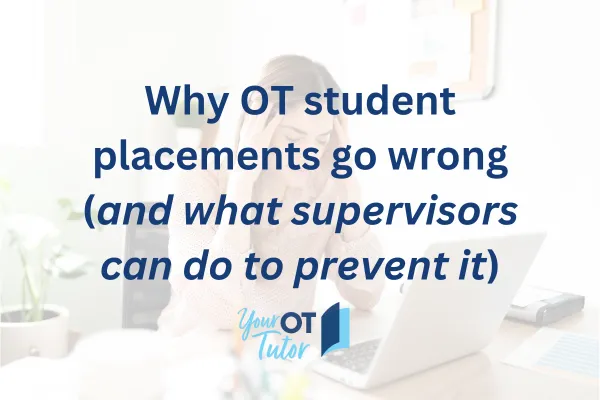THE YOUR OT TUTOR BLOG
Articles on important topics for occupational therapists...


Why OT student placements go wrong (and what supervisors can do to prevent it)
There are new university OT programs popping up each year. This is great – we’re going to need plenty of OTs in the future – but this means that there will be an increased need for student placements too.
You may be hesitant to offer a placement because you think it will go wrong. But what if you could pre-empt these potential challenges and plan for them? In this article I’ll tell you about five common challenges that arise during student placements, and what you can do as a supervisor to avoid them.
1. Student is under prepared.
This can look like the student not knowing what type of placement model you will be utilising (especially if it is something different to the traditional 1:1, such as a project placement or student-led clinic). It could also appear like they haven’t read-up on any background information that could be helpful, such as details about common diagnoses, assessments or treatments they may encounter on placement. Or it could even be that they turn up 30 minutes late on their first day because they underestimate the traffic or parking difficulty.
Now you may think this is the student’s responsibility to sort out, and sometimes it can be something they need to work on from a self-management perspective, but you should always think about if there is anything you could do to avoid these things from happening. Placements can be stressful enough without students feeling like they are needing to guess, or that their problem-solving skills are being tested before they’ve even started!
Supervisor tip: Create a student placement resource kit with some user-friendly pre-placement preparation resources. This could include a template for corresponding with the student when they first make contact, which prompts you to confirm the placement dates and model. An FAQs handout about the logistics of the first day (including hot tips for parking or lunch options), as well as a caseload outline that lists the common diagnoses, assessments and treatments, will give them a bit of direction to do some research beforehand. And while you may send them all this information via email, don’t underestimate the power of actually speaking with them before they start. A Zoom call can be especially helpful to answer questions, outline expectations and allow them to put a ‘face to a name’ to make their first day run smoothly.
Your OT Tutor resource: Clinical educator starter kit – a comprehensive done-for-you kit of resources to help you prepare for placements. https://yott.au/clinical_education_resources
2. Student feels like they are a burden
Even if you don’t want the student to feel this way, it’s very easy for it to happen. You look busy or stressed a lot of the time while they’re with you. You may cancel their supervision sessions and forget to reschedule them. And now they don’t feel like they can reach out to you to ask a question or share that they aren’t coping because they don’t want to burden you more. But this only makes things harder, because the difficulties just snowball.
Again, the ‘not my problem’ view could be that the student should be more proactive and remind you to reschedule appointments, or find someone else to ask when they’ve got a question and you’re in the middle of something. But this is dependent on you looking like an approachable person who would be happy with this sort of initiative, and remember, this may not have been the vibe you were putting out.
Supervisor tip: As soon as the placement is confirmed, block out weekly supervision sessions for the student in your calendar; if you leave it until they start, thinking you’ll get a feel for what they need, it is way harder. Block them out in advance, then juggle them later if your original plan doesn’t seem like the best option, but at least they’ll be in your calendar to start with. Before they start, think about who could be a good ‘go-to’ person if they have a question when you’re not available; make a point of introducing them to the student on day 1 and reassure them they are expected to use their ‘back-up support’ when needed. And remember your student does not need to see and do everything you do. Their brain fill be exploding with new information each day, so give them some down time to process it, or to take a break and work on a less demanding project task. This will also give you time to breathe and catch-up!
Your OT Tutor resource: Book in a 1:1 chat with me to discuss what strategies may be effective in your workplace. https://yott.au/yott_enquiry_form
3. The logistics become a big challenge
If you haven’t had a student before it can be very easy to underestimate the logistics, and it ends up causing chaos and stress. It could be that you’re a mobile OT and you find out day 1 your student doesn’t have a car to meet you at appointments. Maybe you didn’t think about how the student would access client notes if you gave them the option of a ‘work from home day.’ Or maybe you were happy to share your home office, but didn’t realise your student is allergic to your dog!
The outcomes can range from a bit of an inconvenience or something that needs a couple of hours of problem-solving, right up to a situation where it is almost impossible for the student to participate in the placement.
Supervisor tip: Please, please, please – think about these boring but important things before you even offer a placement! While you might be excited to think about what projects they can help you with, or how nice it will be to share your knowledge with a student, the boring logistics are too important to ignore. Some might be an easy fix, like keeping an old laptop available for students to use to access client notes, while others may need you to flag non-negotiables with the university when making your offer so they can allocate an appropriate student (e.g. car essential, no allergies).
Your OT Tutor resource: Read this free eBook BEFORE you put in a placement offer: “Am I ready to host an allied health student clinical placement.” https://yott.au/learninglibrary-supervisingstudents
4. Of course, now is the time your referrals dry up – there’s nothing for the student to see!
You did all the right things and planned an outline of how you would provide opportunities for your student to observe and participate in a range of sessions. You may have had a plan that a week or two in, a senior student may move from observing to taking on a new referral to manage with your guidance. But now (and this always seemed to happen to me!) your normally busy caseload has disappeared. Clients are cancelling, referrals dry up, or clients just aren’t keen to have students involved in their care.
Now you’re worried they won’t have enough time to demonstrate their ability to manage a small caseload, or to see enough ‘example’ sessions before you let them attempt it for themselves. You start to worry that you can’t fairly score them in their placement evaluation, and that you should just give them the ‘benefit of the doubt’ and pass them because it wasn’t their fault.
Supervisor tip: Firstly, please don’t pass students just because they didn’t have opportunities to demonstrate their skills – you need to create different opportunities! You can maximise the chance clients will say yes to having students involved by answering any questions or concerns they have before the student starts, and thinking about what benefits you could highlight for them. If your caseload fluctuates, have some case studies they can work on that takes them through the process they will need to follow when clients are available for them to see – by discussing these you’ll be able to see evidence of their clinical reasoning.
Your OT Tutor resource: Watch the online Your OT Tutor Alliance workshop: “Build your own student resource kit” – we’ll cover how to put together a self-directed learning case study plus much more. Only available to Your OT Tutor Alliance members! https://yott.au/membership
5. Student struggles to meet competency expectations
And finally, a scenario most supervisors fear, even though in reality the likelihood of it happening is smaller than you think – you have a student who struggles on their placement. They could be struggling with the basics of communicating with clients, or you’re finding it really hard to connect with them as a supervisor and you feel like you’re not seeing what you need to see in terms of their competencies, but you can’t figure out a way to move forward.
The problem is if you put these in the ‘too hard basket’ and just fail the student, cancel the placement and move on with your life, the student’s world and job timeframes could be thrown out the window. Or if you do the opposite – pass the student because they might be OK, or you think you may be a harsh marker, or you know you just don’t have the time to put in the extra support they will need, so you take the easier option and just be the nice guy who says nothing. Unfortunately, while in the short-term this seems like the nice option for both you and the student, it means that when they graduate you could be setting them up for failure, because they won’t be able to keep up with their job demands. Instead of delaying their graduation a few months but giving them extra time or support as student, they end up quitting OT all together as a stressed-out new grad who just wasn’t quite ready.
Supervisor tip: Preparation can be key – make sure you do have space in your life during a student placement, to provide extra support if they need it. If something doesn’t seem quite right, don’t wait until the second last week to raise concerns; flag it with the university early so they can help guide you with strategies and concrete goals to work towards while there is still time in the placement to do it. You can also get another supervisor involved for an outside opinion when it’s hard to pinpoint the ‘something is not quite right…’ And most importantly, with whatever strategies you decide to use, it is essential the student is actively involved in identifying what the issue is, and whether those strategies are likely to work for them.
Your OT Tutor resource: This recorded journal club session will take you through some practical tips for optimising the student learning environment to support students who may be struggling: https://yott.au/journal_club_student_placements_march_2023
For those still reading, hopefully there was something there that is achievable in your workplace. If you’d like more info about any of those tips, send me a DM. I offer one-on-one mentoring to help you make the right choices about offering OT student placements. You can also access lots of my freebies to help you along the way – I’ve dropped some links throughout this newsletter, but let me know if you need help finding the right one for you!
And don’t forget, if you enjoyed this article, join the 5250+ subscribers who have already signed up so you don’t miss the next one!
P.S. Are you still looking for ways to be a better OT that loves what they do? Here are 4 ways that I can help you:
· Check out my Learning Library full of resources and courses
· Sign-up for one-on-one or group training and support
· Book a time for a chat to see how I can help
· Sign-up for Your OT Tutor membership
Have you checked out all my social media platforms for more great FREE content? Click here to find my best stuff! https://yott.au/clarebatkinlinktree
#OccupationalTherapy #Student #NDIS #YourOTTutor






